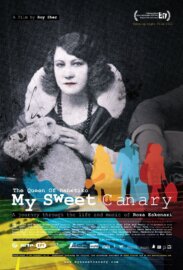
https://www.filmplatform.net/product/my-sweet-canary
An exuberant musical and cinematic journey across Greece, and Turkey in search of Roza Eskenazi, an artist whose music shaped the soundtrack of the region for almost a century. Three artists devoted to her legacy retrace her steps and perform her songs, as they delve into the myriad reasons as to why the music of Greece’s best-known and best-loved Rebetiko singer is still so relevant to them today.

It all began at a small club in Jerusalem. That’s where I first fell in love with the sounds of rebetiko, the music that exemplifies the culture of urban Greece. And yet, it was an Israeli group that was playing, and the lyrics were in Hebrew. In 2004, I discovered the Queen of Rebetiko, Roza Eskenazi, while attending a tribute concert in her memory at the Jerusalem Oud Festival. A singer, Hadas Pal Yarden, performed a selection of Roza’s best-loved songs and shared the story of her remarkable life. The first song I heard was “Smyrneiko Minore,” and I couldn’t understand a word she sang. Yet still, the tremor in her voice as she sang “Aman, Aman” reminded me of Lady Day, whose music had been the soundtrack for all the most intimate, lonely moments of my life. The soulfulness that marked Billie Holiday’s music echoed a life where profound sadness and unprecedented success were ultimately inseparable. As I listened more carefully, I found that rare combination of emotions in Roza’s music too. I was determined to unravel the saga of her life. It was no easy task. Eighty years after her flirtation with stardom, Roza has practically disappeared from the cultural canon of the region in which she saw her glory days. Few people today remember the name of Roza Eskenazi. And yet … and yet so many young people in so many countries continue to dance to the sounds of her music, unaware of the artist herself and the life she poured into that music. As my film began to unfold before me, I realized that it was inevitable that the songs would be more than just a soundtrack. They would form an integral part of the story that I wanted to tell. I wanted to reflect the personal touch that Roza gave to her music back then with the personal touch that modern musicians give to her music today. In the eighteen months that I researched the film in Greece, Turkey, and the U.S., I met with Roza’s surviving family and fellow musicians, with historians and musicologists, and with fans of all ages who shared my >> enthusiasm for Roza and her work. It was the music that spoke the most to them, as it did to me. They understood Roza in ways that transcended the lyrics, whether they were sung in Greek, Turkish, or Ladino. It was as if they communed with Roza through the very timbre of her voice. Her music had become an international language that transcends all boundaries whether real or imagined. It was then that I decided to tell Roza’s story through the journey of three very different artists—from Greece, Turkey, and Israel—whom I met over the course of my own quest. The biographical portrait I had originally planned would be balanced and harmonized with a distinct musical path, sometimes playing in the background, sometimes surging to the forefront, but constantly present throughout the film. I set off in search of Roza and believe that I have found her, but what I also found was a little piece of myself that sometimes seems to have gotten lost in the hubbub of daily life. I reconnected with the sights and sounds of the Mediterranean region that I call home, and most of all with the people of that region, diverse in their languages and their beliefs but united in their appreciation for the musical culture of the region, exemplified by Roza’s music. Their goodwill and devotion to music has made this adventure possible for me, and I cannot adequately express my gratitude to them. I encourage everyone to come see this film, to enjoy its music, and to attend the tribute concerts to Roza Eskenazi that will be launched around the world in 2011. I have just returned from a remarkable journey, and it is now my dream to share its sights, sounds, and scents with you. Last but not least, thank you Roza. I know that you are still singing, wherever you may be. Roy Sher November 2010
About Roza Eskenazi
Roza Eskenazi, who was renowned as Greece’s greatest Rebetiko singer, was an Istanbul born Jew, who immigrated to Greece, and, during the 1920’s, was already recognized as a very talented performer of Rebetiko music. This was the beginning of a career lasting for half a century, during which, Roza sang and recorded hundreds of songs, in Turkish, Greek, Armenian and Ladino.
Roza Eskenazi was born in late 19th century Istanbul, as Sara Skinazi, to a Jewish family, originated from Spain. At a young age, Roza has emigrated from Istanbul to Thessaloniki, which was occupied by the Ottoman Empire, and started performing as a dancer in local clubs and cafés.
Roza’s rise to fame began at the late 1920’s, after she was discovered at a club in Piraeus by composer, and director of Colombia records in Greece, Panagiotis Toundas.
At the height of her career, during the 1930’s Roza recorded 40 songs, in different musical styles (Rebetiko, Greek and Turkish folk songs, Island songs, etc.) each year, and performed not only in Greece, but in Turkey, Albania, Egypt, and the Balkan nations.
During the German and Italian occupation of Greece, Roza kept performing in Athens, while using her connections to assist the Greek resistance, as well as the Jewish community of Athens. She was eventually exposed and arrested by the Germans, but avoided being sent north to the concentration camps, thanks to her relationship with a senior German officer.
After World War II, during the 1950’s, due to the declining of classic Rebetiko (Smyrneiko – “the song of Smyrna”) in Greece, Roza embarked on tours both in Turkey and in the U.S.
Later, during the 1960’s, Roza made new recordings of several of her old songs, and in the 1970’s, after the fall of the colonels’ regime in Greece, and the following increase in Rebetiko’s popularity amongst Greek youths, her career regained momentum – mostly thanks to new performances of her songs by young popular Greek artists, such as Haris Alexiou and George Dalaras.
Roza gave her last performance in September 1977, when she was about 80 years old. In the twilight of her days she suffered from Alzheimer’s disease, before her death on 2/12/1980, at a private clinic in Athens. She left after her, a son and 3 grandchildren, and was buried in a cemetery at the village of Stomio, in the gulf of Corinth.
Roza Eskenazi will be remembered for posterity for the unique interpretations she gave to her songs, greatly influenced by her multi-cultural background.